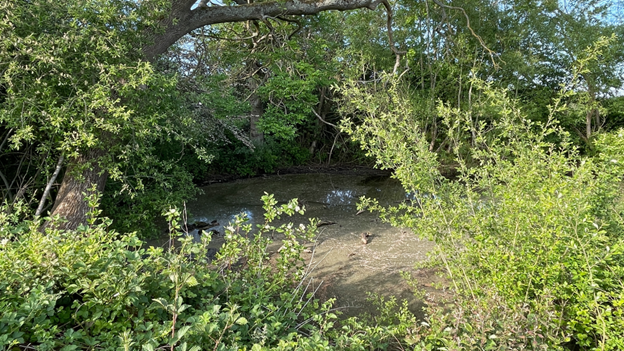Living Lab Blog- University of Warwick
Read the Cheryl Yeung's experiences doing undergrad dissertation with the Living Lab and get to know why should work with the Living Lab if you’d like to be a field scientist, or work in sustainability.

A recent Living Lab project involved assessing the status of Warwick’s ponds, many of which are overgrown like this.
Water quality in small water bodies, especially those surrounded by managed landscapes, fluctuate very easily. The University is committed to protecting, creating and enhancing habitats on campus but sometimes has limited baseline data to inform plans. That’s where my project under the Living Lab comes in as it collected baseline water quality data, which can be used to inform future restoration plans.
My undergraduate dissertation
My research project, titled ‘Determining the concentration of known water quality metrics, such as nitrogen, phosphorus, and dissolved oxygen, around campus and assessing their impact on aquatic biodiversity’ , was part of the Living Lab alongside three other projects by fellow Biological Sciences finalists. Inspired by the field work I did for another assignment about the UK’s polluted freshwater, I designed this research project with guidance from my supervisor, Dr. Sarah Cook, who is a member of the Living Lab. As part of one of the widest environmental assessments done on the University’s grounds so far, we looked at 16 ponds and three streams. We measured chemical metrics of water quality to assess nutrient statuses at each water body, and what kind of ecological effects that could cause on aquatic insects and Great Crested Newts at the University of Warwick. We found that almost all of the ponds were severely phosphate polluted, directly affecting their hospitability to pollution-sensitive aquatic insects, whose numbers have already been declining in the UK.
Valuable databanks may assist with your research
This was the first time chemical data had been collected from many of these ponds. My findings and data might inform future restoration plans to make small water bodies at the University better habitats for aquatic insects, Great Crested Newts, and more, but I could not have done this without recent insect data provided by the Energy and Sustainability Team, who are a part of the Living Lab.
Final thoughts
Not only did I gain valuable field work experience, but there were also plenty of networking opportunities. Ultimately, doing a Living Lab project has been a very rewarding experience, knowing that my research will have real-world impacts!
